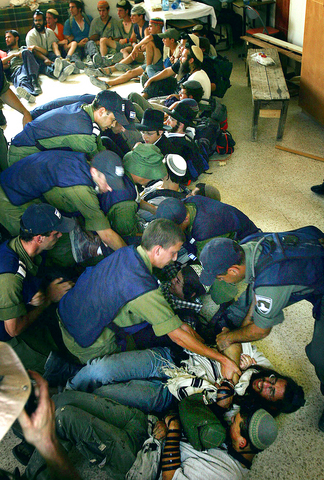Israeli forces smashed their way into two West Bank settlements yesterday and dragged away ultrarightist Jews dug in for a last stand against evacuation after failing to foil a pullout from occupied Gaza.
Police stormed a citadel and synagogues in the Sanur and Homesh enclaves that had been fortified by radicals, drawing a hail of bottles, light bulbs, paint, ketchup, eggs and cooking oil as they began extracting diehard settlers.
Some were plucked from a synagogue roof in the scoop of one of the bulldozers that had rammed through barriers of burning tires and rubbish at the gates to Sanur and neighboring Homesh.

PHOTO: AP
Palestinians want Israel to leave all of the West Bank and Gaza but Prime Minister Ariel Sharon has sworn to keep the biggest Jewish settlements in the West Bank, where some 230,000 settlers live among 2.4 million Palestinians.
Ultranationalists want to make the withdrawal from a pocket of the northern West Bank more painful than the generally smooth evacuation from Gaza, completed on Monday, to deter Israel from ever again ceding Jewish enclaves in occupied territory.
In the face of threatened violent resistance in barricaded redoubts, security forces dispensed with extended negotiations used in Gaza and moved swiftly on radicals hunkered down in three synagogues, a seminary, an old citadel and private homes.
The young ultranationalists had streamed into the two enclaves from other West Bank settlements to bolster a few dozen remaining residents holding out against evacuation.
"You cannot force us out of the land of Israel," one settler mother screamed at soldiers arriving at her door.
After brief attempts to coax out occupants, police equipped with riot batons and shields broke easily into houses and used saws, pile-drivers and sledgehammers to batter their way into two fortified synagogues and a seminary.
They found praying youths prone on the floor, arms entwined, and wrestled to separate them and haul them out to buses.
After surrounding Sanur's citadel, they bashed down the door to take on far-right religious teenagers armed with iron rods and shields, some of them dancing on its roof. A rabbi was negotiating with them to leave peacefully.
But resident settlers in both enclaves began vacating their homes without violence, walking in resignation to evacuation buses. Others, mounting passive resistance, were carried out.
By midday, about 330 radicals had been removed from 19 buildings in Sanur and Homesh, an army spokesman said.
Palestinian President Mahmoud Abbas phoned Sharon to say he hoped the pullout would open a new chapter in relations and the two agreed to meet soon, Sharon's office said. The two last met on June 21 at a tense summit.
Unlike in Gaza, which Israel plans to hand over to Palestinians in October, the Jewish state plans to retain security control of the West Bank after the pullout there.

PRECARIOUS RELATIONS: Commentators in Saudi Arabia accuse the UAE of growing too bold, backing forces at odds with Saudi interests in various conflicts A Saudi Arabian media campaign targeting the United Arab Emirates (UAE) has deepened the Gulf’s worst row in years, stoking fears of a damaging fall-out in the financial heart of the Middle East. Fiery accusations of rights abuses and betrayal have circulated for weeks in state-run and social media after a brief conflict in Yemen, where Saudi airstrikes quelled an offensive by UAE-backed separatists. The United Arab Emirates is “investing in chaos and supporting secessionists” from Libya to Yemen and the Horn of Africa, Saudi Arabia’s al-Ekhbariya TV charged in a report this week. Such invective has been unheard of

‘TERRORIST ATTACK’: The convoy of Brigadier General Hamdi Shukri resulted in the ‘martyrdom of five of our armed forces,’ the Presidential Leadership Council said A blast targeting the convoy of a Saudi Arabian-backed armed group killed five in Yemen’s southern city of Aden and injured the commander of the government-allied unit, officials said on Wednesday. “The treacherous terrorist attack targeting the convoy of Brigadier General Hamdi Shukri, commander of the Second Giants Brigade, resulted in the martyrdom of five of our armed forces heroes and the injury of three others,” Yemen’s Saudi Arabia-backed Presidential Leadership Council said in a statement published by Yemeni news agency Saba. A security source told reporters that a car bomb on the side of the road in the Ja’awla area in

US President Donald Trump on Saturday warned Canada that if it concludes a trade deal with China, he would impose a 100 percent tariff on all goods coming over the border. Relations between the US and its northern neighbor have been rocky since Trump returned to the White House a year ago, with spats over trade and Canadian Prime Minister Mark Carney decrying a “rupture” in the US-led global order. During a visit to Beijing earlier this month, Carney hailed a “new strategic partnership” with China that resulted in a “preliminary, but landmark trade agreement” to reduce tariffs — but

SCAM CLAMPDOWN: About 130 South Korean scam suspects have been sent home since October last year, and 60 more are still waiting for repatriation Dozens of South Koreans allegedly involved in online scams in Cambodia were yesterday returned to South Korea to face investigations in what was the largest group repatriation of Korean criminal suspects from abroad. The 73 South Korean suspects allegedly scammed fellow Koreans out of 48.6 billion won (US$33 million), South Korea said. Upon arrival in South Korea’s Incheon International Airport aboard a chartered plane, the suspects — 65 men and eight women — were sent to police stations. Local TV footage showed the suspects, in handcuffs and wearing masks, being escorted by police officers and boarding buses. They were among about 260 South